
Juan Manuel "Mamo" GuillermoContreras Sepúlveda was a Chilean Army officer and the former head of the National Intelligence Directorate (DINA), Chile's secret police during the dictatorship of General Augusto Pinochet. In 1995, he was convicted of the murder of Chilean diplomat Orlando Letelier in Washington, DC, and sentenced to seven years in prison, which he served until 2001. At the time of his death, Contreras was serving 59 unappealable sentences totaling 529 years in prison for kidnapping, forced disappearance, and assassination.

An authoritarian military dictatorship ruled Chile for seventeen years, between 11 September 1973 and 11 March 1990. The dictatorship was established after the democratically elected socialist government of Salvador Allende was overthrown in a coup d'état backed by the United States on 11 September 1973. During this time, the country was ruled by a military junta headed by General Augusto Pinochet. The military used the breakdown of democracy and the economic crisis that took place during Allende's presidency to justify its seizure of power. The dictatorship presented its mission as a "national reconstruction". The coup was the result of multiple forces, including pressure from conservative groups, certain political parties, union strikes and other domestic unrest, as well as international factors.

The Caravan of Death was a Chilean Army death squad that, following the Chilean coup of 1973, flew by helicopters from south to north of Chile between September 30 and October 22, 1973. During this foray, members of the squad ordered or personally carried out the execution of at least 75 individuals held in Army custody in certain garrisons. According to the NGO Memoria y Justicia, the squad killed 97 people: 26 in the South and 71 in the North.

Raúl Silva Henríquez SDB was a Chilean prelate of the Catholic Church, a cardinal from 1962. He served as Archbishop of Santiago de Chile from 1961 to 1983 and as Bishop of Valparaíso from 1959 to 1961. Both as Archbishop and in retirement, he was an advocate for social justice and democracy and a forthright vocal critic of the military dictatorship of Augusto Pinochet—"a constant thorn in the Government's side".

Bernardo Leighton Guzmán was a Chilean Christian Democratic Party politician and lawyer. He served as minister of state under three presidents over a 36-year career. Exiled as a critic of Augusto Pinochet's dictatorship, he was targeted for assassination by Operation Condor.

The Manuel Rodríguez Patriotic Front was a Marxist-Leninist guerrilla organisation officially founded on 14 December 1983 as the military wing of the Communist Party of Chile in the context of this party policy denominated as the "Política de Rebelión Popular de Masas", created with the goal of a violent overthrow of the civic-military dictatorship of General Augusto Pinochet.

The Catholic Church in Chile is part of the worldwide Catholic Church, under the spiritual leadership of the Pope, the curia in Rome, and the Episcopal Conference of Chile.

Jaime Jorge Guzmán Errázuriz was a Chilean constitutional law professor, politician, and founding member of the conservative Independent Democratic Union party. In the 1960s, he strongly opposed the University Reform movement and became an active organizer of the Gremialist movement. Guzmán vehemently opposed President Salvador Allende and later became a trusted advisor of General Augusto Pinochet and his dictatorship. As a professor of Constitutional Law, Guzmán played a significant role in drafting the 1980 Chilean Constitution. He briefly served as a senator during the transition to democracy before being assassinated in 1991 by members of the communist urban guerrilla organization group, the Manuel Rodríguez Patriotic Front (Autonomous).

The military regime in Chile led by General Augusto Pinochet ended on 11 March 1990 and was replaced by a democratically elected government. The transition period lasted roughly two years, although some aspects of the process lasted significantly longer. Unlike most democratic transitions, led by either the elite or the people, Chile's democratic transition process is known as an intermediate transition – a transition involving both the regime and the civil society. Throughout the transition, though the regime increased repressive violence, it simultaneously supported liberalization – progressively strengthening democratic institutions and gradually weakening those of the military.

Augusto José Ramón Pinochet Ugarte was a Chilean military officer who was the dictator of Chile from 1973 to 1990. From 1973 to 1981, he was the leader of the military junta, which in 1974 declared him President of the Republic and thus the dictator of Chile; in 1980, a referendum approved a new constitution confirming him in the office, after which he served as de jure president from 1981 to 1990. His time in office remains the longest of any Chilean ruler.

Juan Rojas Radrigán was a Chilean playwright, novelist and poet. He was awarded Chile's National Prize for Performing and Audiovisual Arts in 2011.

Ángela Margarita Jeria Gómez was a Chilean archaeologist. Mother of the former President of Chile Michelle Bachelet, she was the wife of the Chilean Air Force Brigadier General Alberto Bachelet, who died after being tortured during the dictatorship of Augusto Pinochet. Jeria served informally in the role of first lady during the first Bachelet government, accompanying her daughter to several official functions. Her official protocolary role was "Director of the Sociocultural Area of the Presidency".
Francisco Javier Cuadra Lizana is a Chilean lawyer, academic, and politician. He was a minister under the military dictatorship of General Augusto Pinochet, dean of the Faculty of Law, and later rector of Diego Portales University.
Cristián Precht Bañados is a Chilean Catholic former priest, known for his work during the military dictatorship in defense of human rights. He was vicar of the Vicariate of Solidarity between 1976 and 1979. In September 2018, he was laicized for his participation in cases of child sexual abuse.
The Association of Families of the Detained-Disappeared (AFDD), is a Chilean human rights group that formed in Santiago in 1974 in the wake of detentions and disappearances of thousands of people by the military dictatorship of General Augusto Pinochet.

José Aldunate Lyon was a Society of Jesus and Chilean teacher, worker, priest and human rights activist during the military dictatorship. He was awarded the National Prize for Human Rights in 2016.
Carlos Wilfredo Alarcón Ferrada was a Chilean Catholic priest. He was imprisoned, tortured, and survived an attempted execution by agents of Augusto Pinochet's dictatorship.

Pinochetism is an authoritarian and personalistic political ideology rooted in the military dictatorship led in Chile between 1973 and 1990 by Augusto Pinochet. Ranging from the right-wing to the far-right, Pinochetism is characterised by its anti-communism, conservatism, militarism, and nationalism. Under Pinochet, Chile's economy was placed under the control of a group of Chilean economists known collectively as the Chicago Boys, whose policies have been described by some as neoliberal. Former and current supporters of the dictatorship are known as pinochetistas.

Sergio Eduardo Diez Urzúa was a Chilean architect and politician.













